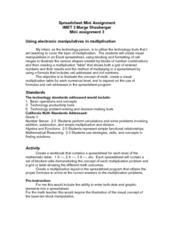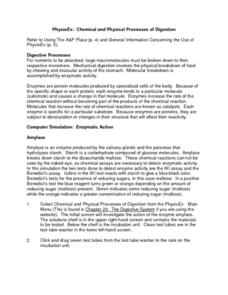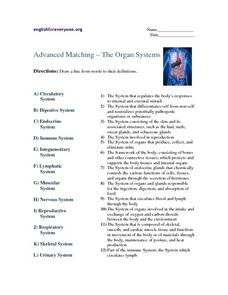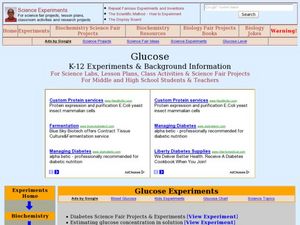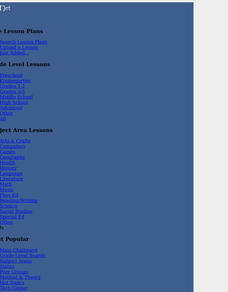Curated OER
Investigating an Enzyme-controlled Reaction: Catalase and Hydrogen Peroxide Concentration
Are you looking for a way to measure cellular respiration? Try it with pureed potatoes. With some standard high school science equipment, biologists can perform an investigation and collect data surrounding byproducts of respiration. You...
Curated OER
Chapter 16, Food Biotechnology
Although the points given on these slides are valid, the visual accessibility is poor. Consequently, many viewers would be distracted or entirely unable to view the presentation. The content is a review of microorganisms and their...
Curated OER
Using Electronic Manipulatives in Multiplication
Factor polynomials using electronic manipulatives. Your class will create a spreadsheet in excel and use it to multiply and perform basic operations and solve problems correctly. They create a visual to go along with each multiplication...
Curated OER
Multiplication Tables Using Microsoft Excel
Eighth graders are introduced to Microsoft Excel as a computer application software program. They create multiplication tables in Microsoft Excel. Students work in small groups. They discuss the $ (anchor) function in Microsoft Excel.
Curated OER
Alcoholic Fermentation in Yeast
Biology learners investigate the effect of sucrose concentration on yeast alcoholic fermentation. During the lesson,they compare and contrast the processes of cellular respiration and alcoholic fermentation. They design an experiment to...
Curated OER
Diffusion through Membranes
Students identify diffusion and its processes through experimentation and calculations. They also use a CBL and conductivity probe to measure the conductivity of various solutions and study the effect of concentration gradients on the...
Curated OER
Integumentary System: A System, An Organ, the Biggest!
It is only six short slides, but an acceptable outline of the integumentary system. General facts about the system, layers, sublayers, and functions are listed as bullet-points. What would make this presentation more engaging for your...
Curated OER
Graphing Iron Data
Students apply a data set to create a graph show how iron ore impacts an ecosystem. They explain how the iron effects the distribution and abundance of phytoplankton in coastal ecosystems using spreadsheet software.
Curated OER
The Beagle Brigade
Students develop an understanding of animal behaviors through reading a case study about detector beagles. They explore the interaction of innate abilities and learned behaviors.
Curated OER
Eating Under the Rainbow
Students investigate the lure of snack-food advertisements to explain how snacks can fit into a healthy diet.
Curated OER
Bacterial Transformation
Students discuss a bacterial experiment they previously performed and complete a pre-assessment. They participate in a lecture discussion given by the teacher through PowerPoint and then complete a cartoon worksheet and post-assessment.
Curated OER
Native American Cultures
Students examine artifacts and pieces of art from various Native American cultures. Using the internet, they research the culture that the artifact came from in more detail noting their lifestyle and contributions to the culture itself....
Curated OER
PhysioEx: Chemical and Physical Processes of Digestion
In this anatomy worksheet, pupils complete 22 review questions in the format of short answer, table completion, and fill in the blank after finishing an online virtual experiment about the chemical and physical processes of digestion.
Curated OER
Advanced Matching - The Organ Systems
What's the difference between the digestive system and the endocrine system? Explore 12 body systems in this anatomy matching worksheet, for which learners find descriptions corresponding to anatomical terminology. Some of the...
Curated OER
Finding and Authenticating Online Information on Global Development Issues
Students discover how to find authoritative resources. For this research skills lesson, students examine strategies for using the Internet effectively to research global development issues.
Curated OER
Bacteria
Students study the advantages and disadvantages of bacteria. In this bacteria lesson students draw and label the different types of bacteria.
Curated OER
What Should I Know about Respiration
How are kids supposed to know what to study for that cellular respiration test? With a study guide or reading guide like the one found here. With three pages of questions important to the understanding of respiration and the processes...
Curated OER
Making Connections-Review Experimental Design and Homeostasis
In this experimental design and homeostasis instructional activity, students complete 20 sentences with key terms about designing experiments, gathering data, graphing data and determining controls. They also complete sentences about...
Curated OER
Obesity
Students examine how hormones affect different tissues. In groups, they make their own hormone-receptor model and identify the characteristics of tissues that respond to the different hormones. To end the lesson, they examine the role...
Curated OER
Microorganism Multiplication
Sixth graders conduct experiments with yeast to study characteristics of microorganisms. They, working is small groups, change the variables in the experiments and note the results which they later discuss as a class.
Curated OER
The Circulatory System
In this circulatory system worksheet, learners read a paragraph about the function of the different organs that make up the circulatory system. Then students complete 3 short answer questions.
Curated OER
Glucose
Students conduct various experiments on glucose. In this biology lesson, students differentiate the process of diffusion and osmosis. They test different foods for the presence of glucose and starch.
Curated OER
Root Beer: Demonstration of fermentation
Name:__________________________________ Class:________ Date:____________
Curated OER
Launching a Defense; Understanding the Human Immune System
Students research online to answer and develop questions about immune system, create Powerpoint presentation to share information with classmates, and assimilate information into pictorial and/or graphical description of immune system.




